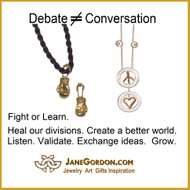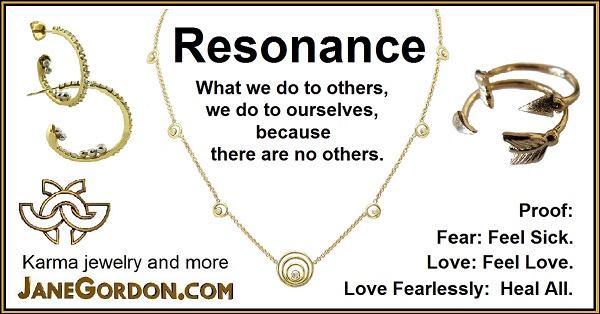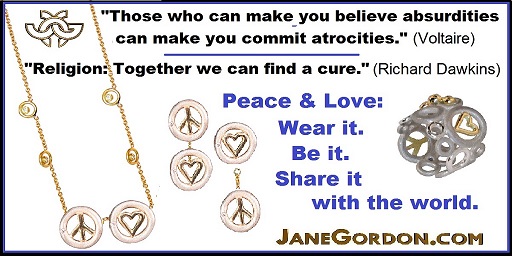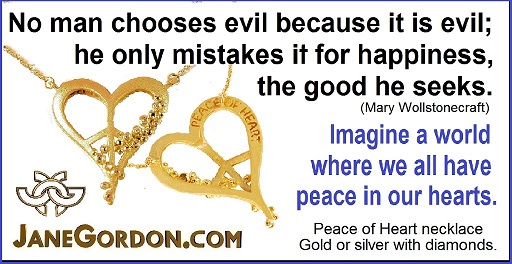"The Rule of Decency: Healing the Divide"
Posted by Jane A. Gordon on 15th Aug 2017
Humans manage to live together in society by agreeing to live by the “Rule of Law”.
Until this divisive political season, we seemed to have been moving towards a society in which we also live by the “Rule of Decency” - an agreement that hate, racism and bigotry were no longer acceptable. We were moving towards a society in which love wins.
We talked about tolerance, which is a wonderful first step towards actually celebrating our beautiful diversity.
Hitler told Germans that it was right to hate, blame Jews for their problems, and force them from Germany. Unable to do that, the only answer, the “Final Solution” was to kill all Jews.
We responded by doing the same thing. We killed to stop the killing. We fought WWII to stop the Nazis. We tell ourselves that dropping nuclear weapons on Hiroshima and Nagasaki saved lives.
It seemed that decency won. Although we did not end the existence of Nazis, we took away their guns, tanks, and power. More importantly, we agreed as a world society that being Nazi is unacceptable. Of course, small groups remained, but their world power was gone - or so it seemed....
Now violent radicals are telling people that it is correct to hate. Some groups tell their followers that immigrants are dangerous, despite more violence being committed by the haters. Other groups sell the story that the west is at war with Islam, and so at war with them. Whatever the story, radicals are creating the same fear which justifies hate to their followers.
Even some of us who believe in love, think it's acceptable to hate the haters. We know that only love and compassion will heal and that's what we have to do: we must love and celebrate our common humanity, even when it is a challenge.
Once again, people across the world and here at home are being taught that hate and blame are acceptable, and the only solution it to kill their enemies.
Hopefully we will take away the guns, tanks and power of violent radicals. That's a start. But we can do more.
Here is today’s avoidable problem as I see it:
The “Rule of Decency” has been demonized as political correctness by those who want to divide us for their own advantage.
Political correctness is a movement towards embracing diversity and ending the use of derogatory names, racist jokes, and openly being hatefully bigoted. Political correctness was our society entering into a “Rule of Decency.” Now that decency is being demonized.
Those in power want to keep us divided to benefit themselves. Politicians are dividing people by selling the idea that racism, bigotry, hate, fear and blame are acceptable. They take 11 of 12 available cookies, and convince the guy with only one cookie that his enemies are the people with no cookies at all.
On the other side, many who believe in love, and are horrified by the messages of acceptable hate, think it’s acceptable to hate those across the political divide.
We wondered how Germans stood by while the stench and ashes from death camps rained down upon them. Look around.
What is the logical destination to this increasingly hateful divide? It’s not going to be good.
How
do we go back to a place where we can exchange ideas and learn from each other?
Hint: instead of pointing fingers and trying to convince each other without
listening, try listening!
When a friend comes to incomprehensible conclusions, I genuinely want to explore the thought process which led to that conclusion. It has become nearly impossible because people seem to confuse conversation with debate. People today only want to win - - but win what?
If we can’t exchange ideas, we are not going to learn, and no one wins.
How do we start listening to each other again? Here are a few ideas:
- Compassion. Someone might have a viewpoint which horrifies you. Remember that you probably are more similar than different in your common humanity.
- Don’t
make assumptions:
- Dismissing a person with opposing views as heartless, uneducated, unintelligent, etc. makes us - -hmmmm - - what do we call a person who has one view of everyone from a certain group? Do you want to be the racist/ bigot?
- Consider the news source: It is tempting to assume that we all have been absorbing the same information. Most people are just struggling to get through their days. If they do pick up a paper or tune into their favorite radio or TV news show, the information they are getting is going to be vastly different depending on the source.
- Listen more! Instead of trying to ‘convince’ try to understand.
- Validate the other person by repeating what they say. This will also clear up incorrect assumptions.
- Give them a compliment sandwich: When you want to tell someone something they might not like hearing, first find something that you genuinely admire in them relating to the issue, and tell them. Then mention your idea, and finally find something else that you genuinely admire about them.
- Agree
and take their point farther, with Motivational Interviewing
https://www.ncbi.nlm.nih.gov/books/NBK64964/
- Express empathy through reflective listening.
- Develop discrepancy between clients' goals or values and their current behavior.
- Avoid argument and direct confrontation.
- Adjust to client resistance rather than opposing it directly.
- Support self-efficacy and optimism.
- Marshal
Rosenberg’s Collaborative communication, 4 step process (Use these on yourself
too when feeling judgmental or frustrated)
https://qz.com/838321/nonviolent-communication-the-scientifically-proven-step-by-step-guide-to-having-a-breakthrough-conversation-across-party-lines/
- Observe and recap without judgment. This slows and clarifies the conversation
- Describe emotions, not positions
- Identify needs
- Make a request (at the moment of understanding and connection)
- Think
about argument more as a partnership, a collaboration where you search for
truth together.
- http://bigthink.com/in-their-own-words/the-key-to-rational-argument-reframe-it-as-a-partnership
- Sloman and Fernbach have done research which gives us what they call "a candle in the dart,"
- It turns out that if people are asked for their stance on complicated political questions (Single-payer health-care, merit-based pay for teachers? etc) people had strong opinions.
- Next, when instructed to explain in detail the impacts of implementing each one. Most people ran into trouble.
- Asked once again to rate their views, they ratcheted down the intensity, and agreed or disagreed less vehemently.
- This might be a good conversation technique in healing today's political divide.
- Read more here: www.newyorker.com/magazine/2017/02/27/why-facts-dont-change-our-minds
- Contrary
to logic, there is some evidence that if someone has a deeply held belief,
presenting facts that conflict with those beliefs has been proven to make them
dig deeper into that mindset. Don’t
judge! We all do it. This is called The Backfire Effect,
Confirmation Bias, Confirmatory Bias, and My Side Bias.
- Here
are two fantastic explanations of the Backfire Effect. The one from The Oatmeal also has excellent
links to research if you want to learn more:
http://theoatmeal.com/comics/believe
https://www.facebook.com/beingliberal.org/videos/687042861479581/ - Note : there are recent studies that suggest that facts can sometimes change minds. It is up to us to learn how to communicate most effectively.
- Here
are two fantastic explanations of the Backfire Effect. The one from The Oatmeal also has excellent
links to research if you want to learn more:
CONCLUSION, LEADING BY EXAMPLE:
Remember that the hardest person to see is the one in the mirror. What we dislike in others usually resides in ourselves, too. In order to listen and communicate more compassionately and effectively, remember to first search in ourselves for the thing we dislike. It takes courage to get past our initial denial to see ourselves clearly. Keep looking.
Learning to see our own flaws (without self-judgment) allows us to grow and live in harmony with our core values. In this way we can be ourselves as we want to see ourselves. Identifying the things we dislike in ourselves makes us more compassionate and more effective at learning and communicating with others.
Now let’s get talking, exchanging ideas, and learning from each other. Let’s heal the divide.
We agree to live by the Rule of Law. Let’s also agree to live by the “Rule of Decency.”






